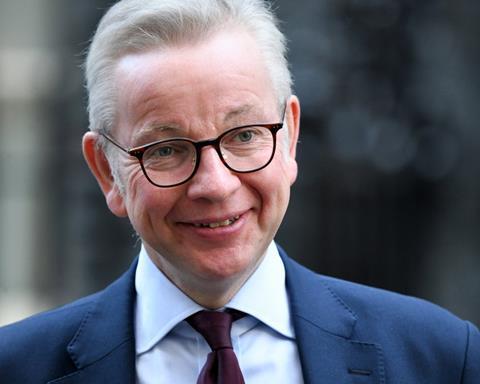Polarising housing secretary says a ‘new generation’ should now lead Conservative Party
Michael Gove has announced that he will not run for re-election to parliament in the upcoming general election. The decision means that – no matter the outcome after July 4 – he will cease to be the secretary of state for levelling up, housing and communities.

Gove has served in the role since October 2022, having previously held the position from September 2021 to July 2022. Before that, he worked in the Cabinet as environment secretary, justice secretary and education secretary as well as chief whip and chancellor to the Duchy of Lancaster.
In a letter announcing his decision, Gove said that “a new generation should lead” the Conservative Party, and thanked Rishi Sunak and the three other Tory prime ministers under whom he has served since 2010.
>> Also read: Gove appears to have woken up to the housing crisis but his solutions are half-baked
He ran through his accomplishments in each office, saying that, during his time in DLUHC, he had built “an unanswerable case for strengthening local communities and shifting power closer to the people”, in the form of the levelling-up white paper.
“I was also pleased to be able to introduce the most wide-ranging reforms to leasehold, social housing and supported housing in a generation,” he continued.
“We have built a million new homes in this Parliament. But just as important as increasing the supply of new homes is work to make sure every existing home is safe, decent and warm.
“That is why we have introduced measures such as Awaab’s Law, to protect social housing tenants, and given tenants everywhere a stronger voice.”
Awaab’s Law, introduced in July 2023 as part of the Social Housing Regulation Act, allows tenants to hold their social landlords to account through legal action if they do not meet certain standards.
Gove also attempted to pass reform to leasehold and renters’ rights.
While the Leasehold and Freehold Reform Act, which makes it easier and cheaper for leaseholders to buy their freehold, was granted Royal Assent earlier this month, the significantly watered-down Renters’ Reform Bill is unlikely to be enacted before the general election.
On housing delivery, Gove has received much criticism from the industry, for his perceived capitulation to Conservative backbenchers.
While he promised to introduce “sharper accountability” for local authorities in his latest National Planning Policy Framework, he was also responsible for making housing targets officially “advisory” rather than mandatory.
Gove also highlighted his role in shepherding in a new building safety regime after the Grenfell tragedy.
“In this role I have also been moved by the testimony of the bereaved, relatives and survivors of the Grenfell tragedy,” he said.
“I am glad we have been able to legislate and act to make buildings safer, to learn from the tragedy and secure funding for a permanent memorial to those we lost.”
While the new building safety regime has been broadly welcomed by the industry, Gove’s hardline approach with developers and product manufacturers over cladding remediation has made him an unpopular figure at times.
Election focus

With the UK set for a general election on 4 July, the country is facing some serious problems.
Low growth, flatlining productivity, question marks over net zero funding and capability, skills shortages and a worsening housing crisis all amount to a daunting in-tray for the next government.
This year’s general election therefore has very high stakes for the built environment and the economy as a whole. For this reason,
Building’s election coverage aims to help the industry understand the issues and amplify construction’s voice so that the parties hears it loud and clear.




























No comments yet